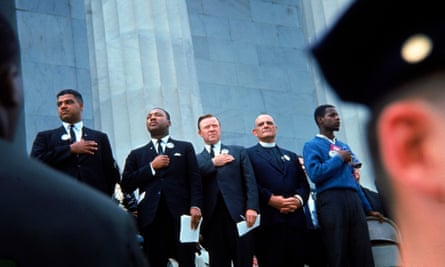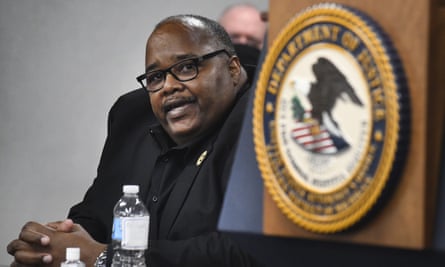The United Auto Workers, once America’s most powerful labor union, a union that led the way in building America’s middle class, has sunk into hard times, with a huge corruption scandal in which 12 union officials, including two former UAW presidents, have been convicted of crimes.
But now many rank-and-filers are hoping the union will regain its moral stature and some of its old swagger through a major push to inject more democracy into the union.
Hundreds of members are backing a campaign to have the UAW hold direct elections for union president, a move they believe will bring more inspiring union leaders, ones they say will fight harder for the union’s rank-and-file.
In recent decades, the UAW has been run by a single party or caucus, with each union president having a powerful say in choosing his successor, and that, dissidents say, led to internal rot – and the wide-ranging scandal in which top UAW officials embezzled more than $1.5m in union money and accepted more than $5m in kickbacks from auto company contractors and Fiat-Chrysler executives.
Earlier this month, a federal judge appointed an independent monitor to oversee the union’s finances and internal elections to help prevent further corruption. The monitor will also oversee a referendum on whether to allow direct elections of the UAW’s president and executive board.
For 70 years, the union’s president has been chosen by convention delegates who have overwhelmingly been from a single group, the Administration Caucus, which was founded by the UAW’s legendary president, Walter Reuther. Reuther led the union during its golden years, when it was celebrated for staging huge strikes and reaching landmark contracts with General Motors and Ford during the 1950s that included generous raises and health and pension benefits that catapulted many workers into the middle class and became a model for unions across the US.

Scott Houldieson, an electrician at a Ford assembly plant in Chicago, says the Administration Caucus has lost its way. Houldieson is president of a new caucus, United All Workers for Democracy (UAWD), which is leading the fight to hold direct elections.
“The Administration Caucus has had control of our union for 70 years. Over the last several decades, it’s gone downhill,” he said, noting that the UAW’s membership has plunged from 1.5 million in 1979 to 400,000 today, because of plant closings, automation and competition from imports and transplants in the south.
Houldieson said: “The corruption scandal is just a symptom of the UAW’s one-party state. We’re hoping that with direct elections, we can break up the one-party state and have checks and balances to not only prevent future corruption, but to get back to our relationship of fighting for the betterment of our members, rather than collaborating with the companies. I think that when members have the ability to directly elect the top leaders who represent them, it’s going to make a big difference.”
No date has been set for the referendum on whether to hold a direct election, although under a consent decree the UAW reached with federal prosecutors, the referendum is to be held in the next six months.
On 12 May, federal district court judge David Lawson in Detroit appointed Neil Barofsky as monitor; Barofsky is a lawyer with Jenner and Block who served as inspector general for the $700bn Troubled Asset Relief Program. The day before, Dennis Williams, a former UAW president, was sentenced to 21 months in prison for misappropriating union funds for personal expenses including private villas in Palm Springs, cigars, high-end liquor and golfing fees and apparel.
Erik Gordon, a professor at the University of Michigan Ross School of Business, criticized the consent decree for not requiring direct elections and for instead calling for a referendum.
“It gives the entrenched leadership the opportunity to stay entrenched,” he said, noting that the rank-and-file is very angry at the union’s leaders. “It’s real important that the UAW regain its credibility and moral standing with the rank-and-file, people who get up in the cold, drive in the midwest winter and go to work.”
Rory Gamble, the union’s current president, hasn’t endorsed direct elections, noting that many UAW board members believe it would let outsiders and outside donors interfere with the union’s politics and policymaking. When the union signed the consent decree in January, Gamble said: “We are committed to making the Monitor’s job a boring one, by doing everything we can to make sure there are no financial or ethical misconduct issues to monitor.”

Nelson Lichtenstein, a labor historian and author of the leading biography of Walter Reuther, vigorously supports direct elections.
“I don’t think direct elections are a panacea,” he said. “But given the actual nature of the beast – the endemic corruption, the collaboration with management, the lethargy of some UAW leaders – given that, direct elections is something that would shake things up. It would release new social forces and energy.” Pointing to the Teamsters, which agreed to direct elections in 1989 as part of an anti-corruption consent decree, Lichtenstein said direct elections create pressure on union leaders to police themselves.
The referendum has not yet been scheduled, and opponents of direct elections have not yet geared up. But the Unite All Workers for Democracy caucus has mobilized, scheduling a week of action the week of 24 May to promote direct elections. Eric Truss, a UAWD activist and a worker at Ford’s Rouge plant in Dearborn, Michigan, has been distributing flyers at several plants. “People are excited about being able to have them make the choice themselves,” he said.
Supporters of direct elections assert that such elections would lead to more rank-and-file involvement and more responsive union leadership, and that, they say, would ultimately help the UAW win more unionization drives. The union suffered stinging losses in unionization elections at Nissan in Mississippi in 2017 and at Volkswagen in Chattanooga in 2019 and 2014.
Rick Isaacson, a longtime auto worker who became president of his local in Michigan, opposes direct elections, warning that it would hurt small union locals.
“I came from a local with only 1,800 members – why would anyone pay attention to my union any more with one member, one vote?” he said. Isaacson, who once served as assistant to the UAW president on union constitutional matters, said the current delegates’ system makes it easier to assure diversity on the union’s 13-member executive board, which has four Black people, one Latina and two women.
“With one member, one vote,” Isaacson added, “outside money is going to become an influence in these elections, and that’s a problem. And then there’s dark money. We see it in our national elections all the time. Why would we think it would be different in our union elections?”
